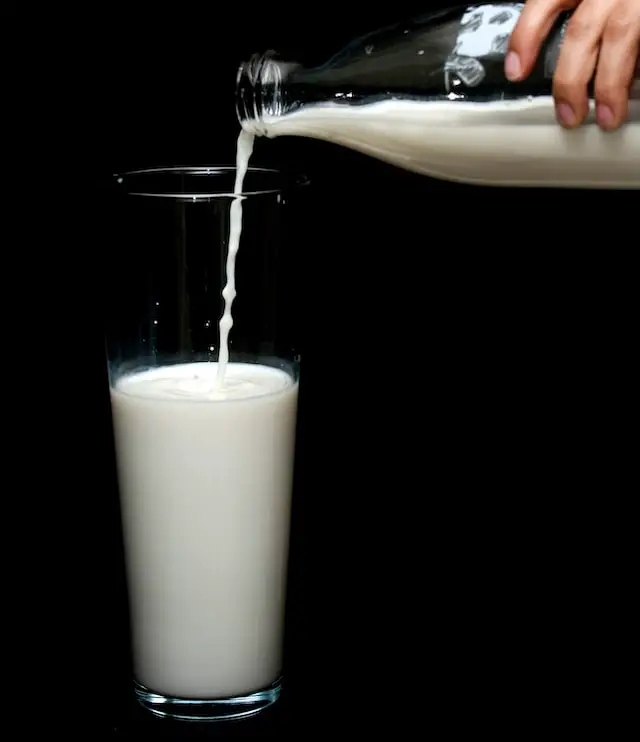Let’s start with square one.
What precisely is milk?
It’s a basic question, yet the majority of people cannot answer it. Milk consists of fat, water, lactose (milk sugar), minerals, and proteins.
Milk is well known as a healthy and high-protein beverage. However, some others consider it to be bad.
Some assert that milk causes weight gain; it is too processed to be healthy, and it can weaken bones.
For decades, milk has been used by bodybuilders as a bulking food because a few additional cups can quickly enhance their caloric intake.
However, this does not suggest that milk causes weight gain directly. No single food will cause you to gain weight just by consuming it.
Body weight is determined by the connection between energy intake (what you consume) and energy expenditure (how much you burn off).
Regarding weaker bones, a study was done to establish the relationship between milk and bone health.
For years, everyone knew that milk was beneficial for the bones until it was discovered that it actually weakens them by removing calcium.
It was determined that a higher calcium intake from milk is connected with greater bone density. However, this does not imply that drinking milk is required for healthy bones.
Many of us eat dairy products every day, whether it’s milk on our cereal in the morning, cheese on our sandwiches, or a delicious scoop of ice cream.

However, after consuming dairy products, many of us feel an overwhelming sense of regret. Will this cause me to gain weight?
Naturally, dairy products include an abundance of calories and protein. Therefore, it’s not surprising that such foods have been linked to weight gain.
Add to this the development of low-fat dairy products such as cheeses, milk, and yogurts, which further promotes the misconception that dairy products cause weight gain.
But do dairy products actually cause weight gain? Do they cause your body to gain weight? Or is this fat beneficial and not to be avoided?
In order to bring you back to reality, let’s settle the subject of whether drinking milk causes weight gain!
Contents
Milk Leads To Weight Gain?
Yes. Consumption of milk might result in weight gain. This is a natural result of an average bottle of milk’s high calorie content. However, the amount acquired can differ among its products.
Naturally, you would acquire less weight if you purchased low-fat milk products. This also applies to skim milk. Skim milk is produced by removing a portion of the cream from whole milk, which reduces the calorie content.
It is also important to note that the weight gained by drinking milk is not naturally undesirable. Even though a certain amount of fat is good for the body, gaining weight or getting fat is usually seen as a bad thing.
Fats help the body absorb important nutrients like vitamin D and vitamin A, and they are also a great source of fuel and energy.
Obviously, gaining too much weight is not a good thing, and if you drank milk every day, you would gain weight quickly and probably not in a good way.

But unlike other foods that can make you gain a lot of weight, milk is high in protein, so the fat you get from milk will go straight to giving you energy instead of being stored as fat on your hips.
Milk will keep you feeling full for a longer period of time, preventing you from nibbling on unhealthy foods for a longer period of time, which will help you maintain a healthy weight.
It is a popular drink among athletes and bodybuilders because the protein can wake up tired muscles and give you more energy in the middle of a hard workout. In this sense, milk is closely associated with weight loss.
Why is Milk Beneficial?
Due to the healthy components of dairy products, humans are raised to consume them from a very young age. Calcium, which is abundant in milk, is beneficial for strengthening bones, the heart, and numerous muscles.
The benefits of calcium apply to people of all ages, hence it is strongly recommended that adults continue to consume it.
These dairy products are one of the five primary dietary groups that contribute to a balanced and nutritious diet.

Studies have connected products such as milk to reduced risks of strokes, diabetes, and heart disease, to mention a few. This drink also aids in stomach strengthening, resulting in more consistent bowel movements.
Milk has also been recognized as a muscle relaxant, which helps many individuals alleviate muscle aches and strains.
This is especially helpful for people who come home from work after a long day because it can help relieve anxiety and stress symptoms like tightness and tense nerves.
It is believed that almost everyone has a basic understanding of the benefits of milk and what it can do for you.
How Much Milk Should We Consume?
Like with other foods and beverages, it is possible to consume too much milk. Over-consuming it in a short amount of time might cause severe abdominal pain and vomiting.
The stomach can only handle a certain amount of milk before feeling overloaded. The average daily guideline for milk consumption is approximately three cups.
Three glasses of milk each day will provide you with the necessary nutrients while preventing you from consuming too much and feeling ill.
If you consume an excessive amount of this potent drink, you may also experience weariness. As previously stated, milk is extremely filling; therefore, consuming excessive amounts of it would certainly lead you to get dull and exhausted.
Conclusion
Milk may lead to weight gain, but if consumed as part of a balanced diet, it can still be extremely helpful to one’s health.
This dairy product is not only useful for building stronger bones but also for boosting energy levels, particularly during intensive exercises and activities.

